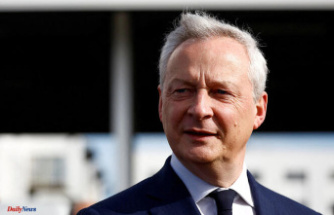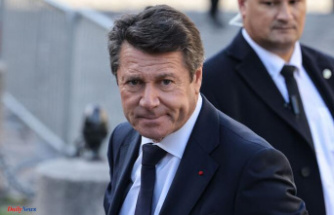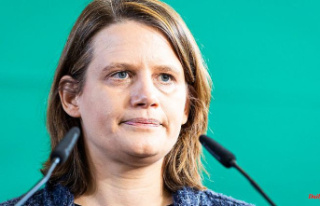As an environmental politician, Andreas Jung has been campaigning for more climate protection for years. In an interview with ntv.de, the CDU politician and deputy federal chairman says where he sees gaps in gas and electricity price brakes, what he thinks of climate stickers and how the parliamentary group looks back on Angela Merkel.
ntv.de: How do you save gas?
Andreas Jung: At home we did what is recommended: We had the heating optimally adjusted, otherwise trimmed for energy efficiency and we heat sparingly.
Are people doing enough?
People save and thus make an important contribution. It's important that we don't let up now. When the frost hit, the energy saving target was not met. This shows that we need even more concrete incentives: For example, a craftsman voucher for 100 euros to initiate as much heating optimization as possible: According to the Federal Network Agency, savings of up to 20 percent can be achieved with this. This is also important with a view to next year: next winter could be even more critical than this one.
The Bundestag has passed the gas and electricity price brake. In your opinion, is that enough?
The prices for gas and electricity must be limited - but also for liquid gas, oil and pellets, for private households and for the economy. Significant gaps now remain with the companies. There is no support whatsoever for small and medium-sized businesses and the skilled trades in the event of high costs due to price increases for liquid gas, oil and pellets. Improvements have only been made here for private households. For example, a bakery that has switched to sustainable pellets falls through the cracks. For large parts of the industry, the effect of the price brakes is threatened by high hurdles and upper limits: This is also due to European requirements, but the traffic light has saddled it again nationally - and thus deviates significantly from the recommendations of the Gas Commission. Our industrial fabric is at stake. The federal government must therefore make improvements and renegotiate in Brussels.
But the industry still gets a gas price of seven cents.
Also 7 cents are about a doubling of the industry price. However, we are not criticizing this regulation per se. Due to the high hurdles, however, there will be many companies that will not be able to benefit from this brake at all. You don't pay the 7 cents per kilowatt hour, but the current market price. For example, too high demands are placed on the decline in profit. Another core of our criticism is the implementation of skimming off so-called "random profits". This threatens collateral damage for the energy transition, a brake on renewables.
In what way?
The Easter package aims to speed up the expansion of renewable energies. Skimming as it has now been knit leads to the opposite. Fictitious amounts are skimmed off instead of real profits. Investments are already being postponed, including in photovoltaics and wind power. In the renewables sector, people speak of a "traffic light prank" and lawsuits are being filed. In the middle of the energy crisis, the traffic light puts important capacities at risk. What is supposed to ensure stability in the crisis is damaging energy security and climate protection.
What is the problem with skimming?
We don't generally criticize the fact that it's skimmed off, but how it's done. In the case of the oil companies, actual profits are taxed. In the case of renewables, on the other hand, profits are not important at all, but imputed yields. Some of them aren't there at all. So it is also skimmed off where there is nothing at all. The term "accidental profits" is therefore misleading. Take bioenergy: higher yields are offset by higher costs because the prices of the raw materials and production costs have risen. If too much is skimmed off, production is shut down and capacities are lost.
Improvements have now been made on the home straight, but there is still an imbalance: Hard coal is completely exempted because of the increased costs there, while complex regulations apply to sustainable bioenergy: For large biogas plants, the levy remains. But it is precisely there that considerable capacities are at stake. Waste wood power plants, for example, are generally deprived of their economic basis. We counter this with our model: Skimming off only where there are real profits and betterment when investments are made. We need incentives for investments instead of new caps!
A crazy year is behind us. Coal-fired power plants have been ramped up again, we have new gas supply contracts - is it a lost year for climate protection?
This year we had to take paths and detours that we no longer wanted to go, such as restarting coal-fired power plants. This is necessary because everything must be done to avert an energy shortage. But I criticize the fact that coal-fired power plants are ramped up for two years with the option to extend it, while nuclear power plants only run a few months longer. To be clear: I support both policy decisions, phasing out coal and phasing out nuclear energy. But now it's a matter of using all existing possibilities again in the crisis. But then switch off the low-CO2 variant and drive the climate-damaging variant longer, that just doesn't go together from the point of view of climate protection.
Meanwhile, climate adhesives make the headlines. Do you understand the concerns of the activists?
A clear distinction must be made between the cause and the means. I understand the issue of climate protection. But I don't have the slightest understanding of the means used by the climate stickers. We live in a democracy and have every opportunity to get involved in issues, including protesting democratically. As environmental politicians from different parties, we fought for a climate protection law for a long time. Why were we able to break through in 2019? Also because there was a lot of public pressure, climate protection was the number 1 topic in public perception. There were Fridays for Future demonstrations, YouTube videos, calls from a wide variety of groups. It wasn't just the young generation, but also parents, grandparents, and many in the churches and elsewhere who formulated the expectation: you have to do more.
As the CDU, we also had significant losses in the European elections because we were difficult to explain how we were going to achieve our own goals. One consequence of this was the Climate Protection Act. Things became possible that were not possible before. Political engagement in democracy is the way to make a difference. That's why I have zero understanding when crimes are committed, other people are endangered or works of art are damaged. That doesn't help the issue in any way either: you have to draw a very clear line. Political progress is achieved by courting majorities in society, not by crossing borders that are punishable by law.
How do you look back on Angela Merkel in the parliamentary group? She knew exactly what climate change meant and now she is being accused of not having achieved enough.
At the end of her term of office, she said herself that despite all the progress, not enough has happened given the objective situation. But you have to differentiate. She was environment minister, she negotiated Kyoto. She brought her convictions and these experiences with her to the Chancellery. In her early years, she did a lot for climate protection, here and internationally - she was described as climate chancellor. In 2015 she was instrumental in the success of the Paris Agreement.
In the situation mentioned in 2019, she then pushed very hard for a strong climate package: The national CO2 pricing for transport and buildings was enforced, in 2021 we enshrined climate neutrality in law in 2045 - and thus went beyond the requirements of the Federal Constitutional Court. However, we all failed in that we did not advance climate protection with the vigor that would have always been necessary by overcoming the financial crisis, the euro crisis and the refugee issue. The lesson from this is: Even if there are other crises, climate protection must not be neglected. In the corona pandemic, it was then possible to bring the two together.
But the expansion of renewable energies has slowed down.
In these 16 years we have made considerable progress in expanding renewable energies. But it is also true that it should have gone even faster. Today, we don't see our role as the opposition in throwing a spanner in the works; on the contrary, we are driving forces: With the Easter package, we only made suggestions on how to speed things up even further. How to make progress not only with sun and wind, but also with hydropower, geothermal energy and bioenergy.
Did everyone in the CDU and CSU understand how dramatic climate change is?
Friedrich Merz says with unsurpassable clarity that climate protection is an outstanding task. Again this week. There is no mistake and there shouldn't be. Our "C" stands for Christian values. Then the integrity of creation must be a paramount goal. In the competition for the best concepts, climate protection must therefore be just as much a core competence of the Union as economics, finance or internal security. We sometimes offered crosses, that can't be anymore. This is crucial for the future viability of the CDU.
Would you sometimes rather be with the Greens?
no I'm black-green - in football as a member of VfR Stockach since the E-Youth. In politics, I am black by conviction and I feel very comfortable in the CDU. Bringing the environment, economy and social affairs together is the major task today - and that suits the CDU. It was the founding idea of the CDU to bring different people together to seek balance. This is how the social market economy came into being. Now it's about combining the social market economy and consistent climate protection, bringing together prosperity for everyone and the path to climate neutrality. We have had the social and ecological market economy in our basic program since 1994. However, we have not always implemented them consistently. We must claim to be the party of sustainability. In recent years we have developed important concepts for this. But not everything has been implemented yet. We now have to build on this and continue to explore the content.
That would sound similar to the Greens.
There are also many there who have a very state-heavy understanding and believe more in the planned economy than in the market and innovation. But I don't define myself by distinguishing myself from others. I joined the CDU because I believe in the CDU. As Christian Democrats, we are committed to the principles of the market economy. We now have to bring these together with ecology - the strength of the market and the power of nature. I am happy to work on this task.
Volker Petersen spoke to Andreas Jung












